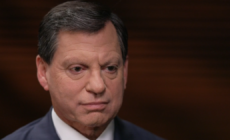-
Foreclosures are surging as U.S. homeowners grapple with rising costs - 3 mins ago
-
George Clooney worried about raising kids in Hollywood culture environment - 9 mins ago
-
Sleeper Promo Code NEWSWEEKXL: Get $100 Match Bonus For MNF, MLB Playoffs - 12 mins ago
-
‘These fans are phenomenal’: Mariners Cap Off Epic Seattle Sports Weekend - 17 mins ago
-
Hitman reveals bank executive’s plot to kill estranged wife amid torrid affair with former stripper - 36 mins ago
-
Social Security chief Frank Bisignano also named CEO of the IRS - 43 mins ago
-
James Bond fans left confused over new Amazon images - 51 mins ago
-
Dak Prescott Playing Like an MVP While Carrying the Depleted Cowboys - about 1 hour ago
-
Woman's brutal killing hidden by trailer park fire - about 1 hour ago
-
Cake popularized by Tom Cruise’s holiday gifting is recalled over health concerns - about 1 hour ago
Palestinian statehood condemned by Israeli officials brings a ‘glimmer of hope’ for some Palestinians
As Palestinians and much of the Arab and Muslim worlds praised the decision by several European countries to recognize Palestinian statehood, Israeli politicians across the political spectrum reacted with anger and spoke of retaliation.
“You are giving a huge prize to terrorism,” Israeli Prime Minister Benjamin Netanyahu said in a recorded address released Sunday night, as countries including the United Kingdom, Canada and Australia began to express their commitments to Palestinian statehood. “It will not happen. There will be no Palestinian state west of the Jordan River.”
France formally recognized Palestinian statehood at a United Nations meeting on Monday.
The statehood acknowledgements were “a diplomatic disaster,” Israeli opposition leader Yair Lapid, a long-standing opponent of Netanyahu, posted on X on Sunday. He added that it was “a harmful step” and a “reward for terror.”
Though the fast-moving diplomatic events are mostly symbolic, the resentment across Israel’s political class shows just how isolated the Jewish state has become two years into its war with Hamas that has upended much of the Middle East.
The Trump administration has also warned of possible repercussions for countries taking measures against Israel, including France. But European leaders defended their decisions, calling them a strike against Hamas rather than a pledge of support for what Israeli leaders called a potential “terrorist state.”
“Recognizing Palestine is a categorical disavowal of Hamas, and it permanently isolates it,” French Foreign Minister Jean-Noel Barrot said on French channel TF1. “It vindicates those among the Palestinians who have chosen to renounce violence and terrorism.”
Netanyahu said that his government’s response would not come until next week after he returns from the United States. His trip will include an address to the United Nations General Assembly in New York on Friday and a meeting with President Donald Trump on Monday.
Netanyahu’s choices, reported by Israeli local media, range from a face-saving climbdown to more drastic moves that could threaten Israel’s hard-won partnerships with its Arab and Muslim neighbors.
The prime minister faces substantial pressure from his right-wing ideological flank, particularly hard-line ministers in his government, to retaliate by annexing the whole of the occupied West Bank.
But the United Arab Emirates, one of a handful of Arab nations that maintain diplomatic relations with Israel, already warned Israel earlier this month that annexation would be a “red line.”
The UAE did not specify what action it might take, but officials told Reuters they were considering downgrading the UAE’s diplomatic ties with Israel, potentially damaging the U.S.-brokered Abraham Accords, one of Israel’s most important diplomatic victories in recent memory.
British Foreign Secretary Yvette Cooper told the BBC that she had warned the Israelis against annexing all or part of the West Bank.
Short of taking over the West Bank in full, senior Israeli officials also discussed the possibility of bringing more West Bank territory now governed by the Palestinians under full Israeli control, according to media reports in the country.
Israel may also decide to shutter France’s consulate in Jerusalem, which tends to deal with issues related to the Palestinians, the reports said. Israeli leaders are focusing their outrage on France because it was the first in a series of Western countries to announce that it would recognize a Palestinian state last summer.
For Palestinians in the Gaza Strip, the decisions were met with cheer and relief — a sign that the West is finally ready to treat Palestinians as equal.
“This is a beginning, or a glimmer of hope for the Palestinian people,” said Fawzi Nour Al-Deen, a displaced person from the north of Gaza. “We are a people who deserve to have a state.”
But for others, the lofty, abstract diplomacy unfolding in New York felt a world away from the suffering in the famine-stricken enclave where more than 65,000 people have died in almost two years of war with Israel, which began with the Hamas-led terrorist attacks on Oct. 7, 2023, in which 1,200 people were killed and about 250 taken hostage.
“Where is the state? In the street? Or in the tents? What state is this that [they] recognize?” said Mohammed al-Yazigi, a displaced person in central Gaza. “Are we able to find something to eat or a place to stay? Leave it to God.”
Source link





























